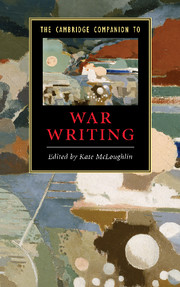Book contents
- Frontmatter
- Introduction
- Part I Themes
- Part II Influences
- Part III Poetics
- 8 Medieval warfare
- 9 Early modern war writing and the British Civil Wars
- 10 The eighteenth century and the romantics on war
- 11 American Revolutionary War writing
- 12 The Victorians and war
- 13 The American Civil War
- 14 The First World War: British writing
- 15 The First World War: American writing
- 16 The Spanish Civil War
- 17 The Second World War: British writing
- 18 The Second World War: American writing
- 19 American writing of the wars in Korea and Vietnam
- 20 The Cold War and the “war on terror”
- Index
9 - Early modern war writing and the British Civil Wars
from Part III - Poetics
Published online by Cambridge University Press: 28 January 2010
- Frontmatter
- Introduction
- Part I Themes
- Part II Influences
- Part III Poetics
- 8 Medieval warfare
- 9 Early modern war writing and the British Civil Wars
- 10 The eighteenth century and the romantics on war
- 11 American Revolutionary War writing
- 12 The Victorians and war
- 13 The American Civil War
- 14 The First World War: British writing
- 15 The First World War: American writing
- 16 The Spanish Civil War
- 17 The Second World War: British writing
- 18 The Second World War: American writing
- 19 American writing of the wars in Korea and Vietnam
- 20 The Cold War and the “war on terror”
- Index
Summary
Early modern war writing was neither transparent nor impartial, but in many ways a continuation off the field of the battles begun on it. Whether a professional soldier, gentlemen volunteer, or nobleman from the very elite of Europe's aristocracy, an early modern war writer mustered whatever rhetorical muscle he could in order to shape his military memoirs, experiences of battle, or views on strategy into a persuasive whole. Demand for war writing grew throughout the sixteenth and seventeenth centuries and publishers increasingly cared more about the vividness of a report than they did about its accuracy. Eyewitness accounts were valued, but phrases about “the thundering shot of the canon [which] calleth me to my place” were no guarantee that the writer had actually been present at events. The newly founded grammar schools taught sixteenth-century schoolboys that powerful language was part and parcel of great military command: it enabled success on the battlefield by commanding respect and it gave the victor means to commemorate his victory and tactics. Julius Caesar was idolized as the greatest commander and orator of the ancient world, his Commentarii de bello gallico (Commentaries on the Gallic War) (58-52 BCE) becoming a fixture on the Elizabethan school curriculum. Admiration for Caesar and warrior-orators like him forms part of the cultural background to the warrior-heroes of Marlowe's and Shakespeare's 1590s drama - men like Tamburlaine and Henry V, who fought as eloquently as they spoke and whose eloquence was integral to their command. This chapter considers early modern war writing in two sections: the first focuses on the sixteenth century, the second on the British Civil Wars.
- Type
- Chapter
- Information
- The Cambridge Companion to War Writing , pp. 98 - 111Publisher: Cambridge University PressPrint publication year: 2009

